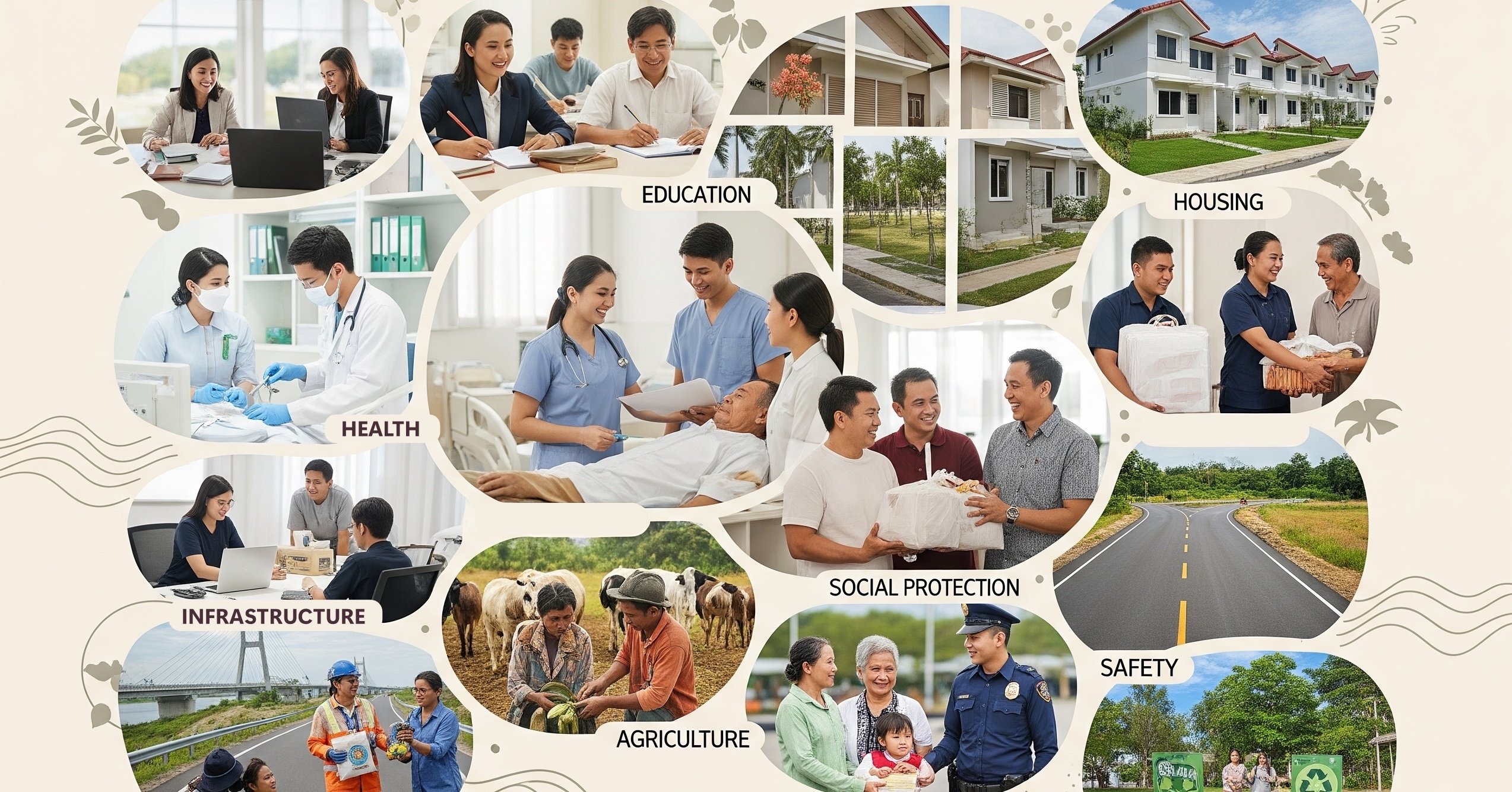The Philippine government provides a broad range of public services aimed at ensuring basic needs, improving quality of life, and driving national development. These services cover health, education, housing, employment, infrastructure, agriculture, social protection, safety, and the environment.
Many are offered free of charge or at subsidized rates, especially for low-income families, senior citizens, and vulnerable groups. For Filipinos both in the country and abroad, understanding what these services are and how to access them is key to making the most of available support.

Health Services
When a family member gets sick, the first worry is often the hospital bill. That’s where the country’s health programs come in:
- Universal Health Care via PhilHealth – Offers subsidized or free hospitalization, consultations, and medicines for indigent members. It’s the backbone of affordable healthcare in the Philippines.
- Public hospitals and rural health units (RHUs) – Managed by the Department of Health (DOH) and local governments, these facilities bring medical care to towns and barangays.
- Vaccination and disease prevention programs – From nationwide immunization drives to TB control and HIV awareness campaigns, prevention is prioritized.
Together, these services ensure that access to healthcare is not just for the privileged few.
Education Services
Education remains a pathway to better opportunities. The government invests heavily to keep it accessible:
- Free basic education – Public elementary and high schools under DepEd guarantee free tuition for millions of Filipino children.
- Free tuition in SUCs – State universities and colleges provide free tertiary education, while TESDA offers technical-vocational training for employable skills.
- Scholarships and subsidies – Programs for low-income students, OFW dependents, and special skills training help bridge gaps for those who might otherwise drop out.
For many families, these initiatives mean the difference between staying in the poverty cycle and stepping out of it.
Housing and Shelter
A roof over one’s head is a basic need, and the government supports this through:
- Socialized housing (NHA) – Affordable housing projects for low-income families.
- Relocation programs – Assistance for informal settlers and those displaced by disasters.
- Pag-IBIG housing loans – Lower interest loans for workers and members, making homeownership more attainable.
Housing programs not only provide shelter but also create stability for families.
Livelihood and Employment
Filipinos are known for resilience, but skills and resources are key to improving livelihood:
- TESDA training and certification – Prepares workers for both local and overseas jobs.
- Microfinance and small business support – DTI and DOLE programs encourage entrepreneurship and self-reliance.
- PESO job fairs – Public Employment Service Offices in LGUs help match job seekers with opportunities.
These initiatives strengthen the workforce and reduce unemployment.
Infrastructure and Utilities
Every road we travel and every market we visit reflects government investment:
- Roads, bridges, and transport systems – DPWH and DOTR lead in building and upgrading infrastructure.
- Water supply and sanitation – Often developed with LGUs to ensure access to clean water.
- Public markets, ports, and terminals – Support trade and daily mobility for communities.
These services connect people, goods, and opportunities across the archipelago.
Agriculture and Fisheries
The backbone of food security lies in supporting farmers and fisherfolk:
- Seeds, fertilizers, and equipment subsidies – DA and BFAR provide assistance to improve production.
- Training and farm-to-market roads – Boost productivity and ease distribution.
- Price support programs – NFA rice procurement ensures farmers earn fair prices.
This sector keeps food affordable while sustaining rural livelihoods.
Social Welfare and Protection
The government also ensures that vulnerable groups aren’t left behind:
- Pantawid Pamilyang Pilipino Program (4Ps) – Conditional cash transfers to poor families tied to education and health compliance.
- Social pension for seniors – Cash grants for indigent elderly citizens.
- Assistance for PWDs – Discounts, livelihood aid, and rehabilitation services.
These safety nets protect dignity and support inclusion.
Public Safety and Justice
No community can thrive without peace and order:
- Police and fire protection – PNP and BFP serve as first responders to emergencies.
- Disaster risk reduction – NDRRMC coordinates disaster preparedness and relief.
- Legal aid – PAO provides free legal services to indigent clients.
Together, these services safeguard lives, property, and rights.
Environmental Services
In an era of climate change, protecting natural resources is non-negotiable:
- Waste management and recycling – LGUs lead community-level programs.
- Reforestation and marine protection – DENR and BFAR initiatives restore ecosystems.
- Climate change adaptation projects – Flood control systems and coastal defenses protect communities.
These measures remind us that development must go hand in hand with sustainability.
A Special Note for OFWs and Families
Many services extend to Filipinos working abroad and their dependents:
- OWWA scholarships for children of OFWs.
- Reintegration loans for returning workers.
- Livelihood kits to help start small businesses.
For families separated by migration, these benefits provide stability and hope.
Conclusion
Public services in the Philippines are more than programs—they’re lifelines. From healthcare and education to housing, employment, and disaster relief, they touch every stage of a Filipino’s life. Knowing what’s available allows us to access the support we deserve and hold agencies accountable.
For OFWs and those back home, these services reflect one truth: government, at its best, is meant to serve its people. And when citizens are aware and engaged, these services can truly transform lives.
